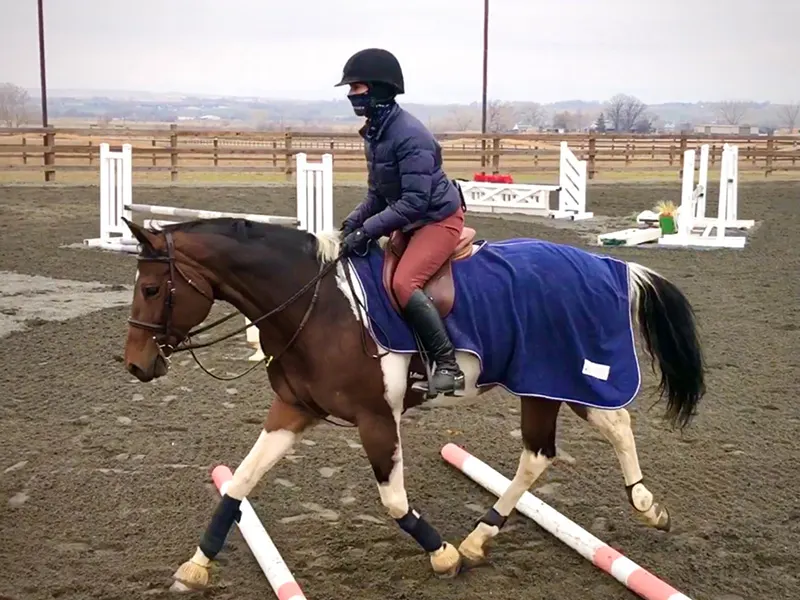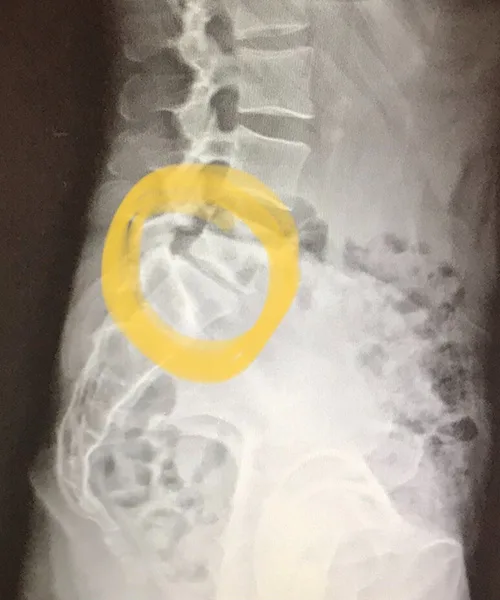Like many riders, my own personal health and well-being was (and is) often ignored for the benefit of my horse. Callie gets regular massage, chiropractor and now acupuncture as well. Me? I usually just try to jam my back against a sharp corner whenever I can.
Despite some serious injuries from riding, both growing up and as a professional, this method of self-care normally kept me going. I suffered through a broken back (diagnosed a year after the fact), broken toes, hyperextended knees, and all sorts of other aches and pains while unloading trucks of hay, packing and hoisting large McGuinn show trunks (my lord, are those things heavy), and getting tossed around while ferrying excited horses to and from turnout.

With horseback riding, unlike many other sports, there always seemed to be the promise that, with good self-care, we can be competitive well into our later years, says blogger Sophie Coffey (shown here riding her mare Callie). The challenge is that “self care” and being an equestrian rarely go together. Photos courtesy of Sophie Coffey
“You’re going to pay for this someday,” a little voice in the back of my mind said. I ignored that voice, because my ability to carry on through pain made me feel as though, no matter how bad it got, I would be able to tough it out.
About two years ago, burnt out with my desk job, I found a great grooming gig at an extremely well respected show stable. I looked forward to working outside with horses again, being on my feet and using my hands, looking at the sum of my work at the end of the day and feeling like I actually accomplished real tasks instead of just sending emails into some virtual cloud.
By the third day on the job, though, the body I’d always depended on to plow through barn work gave up on me. I remember reaching down for a turnout boot when my back seized up so suddenly that I found myself flat on my butt in the middle of the aisle, a confused horse staring down at me. Every little spook or jostle on the way to the paddocks almost took me off my feet. By the end of the sixth day, with tears in my eyes, I decided that I just couldn’t do what I did in my 20s. I had to leave the position, feeling completely defeated and terribly guilty.
After a few weeks of rest, my body returned to its normal state of mild discomfort. This, I was used to. Sometimes I felt worse after a jump session with Callie or after I rode other horses who had a little more movement to their step (I bought an ineffectual back brace for this reason), but all in all, I kept going with the same tough-it-out attitude that served me in my youth. Maybe I could no longer work with horses as a profession, but I was serviceably sound for my daily rides.
ADVERTISEMENT
Then came the pandemic. My normal routine of walking around at the office turned into sitting on the couch most of the day, with the exception of my run and barn time. By mid-October, pain woke me around 5:30 a.m. every day, despite the ibuprofen I popped regularly. Keeping my wiggly baby Thoroughbred Quill straight and forward became a delicate negotiation with my back muscles.
Things went steadily downhill until every day became a functionality crapshoot. As soon as I received my first vaccine, I made an appointment to get a massage, thinking that would set my body straight.
It didn’t. Which is how, about a week ago, I found myself staring at an X-ray of my lower back, listening to a doctor explain about disc deterioration and the space between this and that and how my 39-year-old spine was more normally seen in people much older than me. Eventually I was able to ask the most important question: Will I be able to keep riding?

Radiographs of Sophie Coffey’s back showed disc compression and deterioration in the lower lumbar region, which potentially could limit her days in the saddle if left untreated.
“Those sorts of activities may have a shelf life for you,” he said. “Riding is a very percussive sport, and eventually you’ll have to decide how much pain you want to put up with and find another activity to keep you sane.”
He then started to chat about taekwondo and how he knew he wouldn’t be able to do it forever, but I suddenly felt like I was going to throw up, something I’ve only experienced one other time, when I was looking at the X-ray of Callie’s shattered split bone.
In my mind, I had planned to be like the incomparable Betty Oare, riding with style and class for the entirety of my life. Instead, I was suddenly looking at a “shelf life,” and there was still so much I wanted to accomplish, including potentially showing at 3’6” — something that requires a healthier back than the one I currently have.
ADVERTISEMENT
I walked out with a prescription for muscle relaxants and an appointment with a physical therapist.
My mom, also a physician, took a look at the X-rays and said she didn’t think it was so bad. With physical therapy, she said, I would be even better than before. But the pain in my back, which I always just shrugged off before, stayed in place now that I knew I essentially had kissing spine.
Getting older is inevitable. But with horseback riding, unlike many other sports, there always seemed to be the promise that, with good self-care, we can can be competitive well into our later years. The challenge is that “self care” and being an equestrian rarely go together.
Even today, so very few of our grooms and assistant trainers (and head trainers) have health insurance or a chance to successfully rehab injuries the way we allow our horses to. When I was a pro, if I didn’t work, I didn’t get paid, so I worked no matter what. Now, I’m facing the consequences of those actions.
I know that physical therapy will improve my functionality, and that’s a step in the right direction. Still, the doctor’s words—“shelf life”—echo in my head. Who, as a rider, ever imagines that our own limitations will one day keep us out of the saddle? I certainly never did.
We, as a community, tend to talk about mental limitations much more than physical ones, the former being true roadblocks and the latter being inconveniences we need to negotiate with pills and grit.
My future as a rider is now very much wrapped up in self care, and I hope that a few months of physical therapy will help get my back in much better shape. One thing for sure, I will never take another ride for granted now that I know there’s a chance they may be limited.














